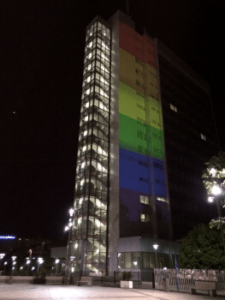Rule of Law and Gaps in LGBTI Protections in Kosovo
By Dan Ward
Rule of law problems are a major field for international development work. In practice, this means addressing discrepancies between legal protections for vulnerable groups, and lack of “on-the-ground” enforcement of these protections. While rule of law issues certainly exist in highly developed countries as well, they tend to be more prevalent in less-developed countries. One such country is Kosovo, which is in the unique position of being a recently sovereign Balkan nation that saw significant Western European influence and U.S. advisory in the drafting of its constitution.
As a result, Kosovo is a country with uncommonly good constitutional protections for LGBTI rights by regional standards. Kosovo’s constitution includes sexual orientation as a protected class, and defines marriage using non-gender specific language, although the current Family Law bill defines marriage as between a man and a woman. While there is no constitutional protection for transgender or intersex individuals, there is also no constitutional justification for discrimination against them. In another sign of formal legislative progress, the national Anti-Discrimination Law was amended in 2015 to include gender identity as a protected class.
Moreover, Kosovo enjoys the presence of three active LGBTI rights and advocacy groups: the Centre for Social Group Development (CSGD), the Center for Equality and Liberty (CEL), and the Center for Social Emancipation (QESh). WI-HER spoke with Liridon Veliu, the Executive Director of QESh. QESh organized the first Kosovar celebration of the International Day Against Homophobia and Transphobia (IDAHOT) in 2014 with a march in the capital of Pristina. CSGD and CEL also stepped in to organize the following IDAHOT marches in 2015 and 2016.
The first march in 2014 was widely celebrated as a positive sign for LGBTI rights, particularly due to the level of official involvement: the former President of Kosovo participated in the march, and the rainbow flag was projected onto a government building.

While these events do indeed symbolize the growing official and public acknowledgement of LGBTI people in Kosovo, there remains a large gap between this symbolic form of public acceptance and the reality of widespread ignorance or even denial of the existence of LGBTI individuals in Kosovo. Most LGBTI people remain closeted, even in legal contexts or when seeking medical care. This is understandable given the lack of rule of law enforcement of already-existing constitutional and legal protections for LGBTI individuals.
To date, no cases have been prosecuted under the sexual orientation or identification portions of the Anti-Discrimination Law. A survey by CSGD and the Youth Institute for Human Rights (YIHR) found that only 33% of state prosecutors agreed that there was any violence against the LGBTI community. Several of these prosecutors denied that any LGBTI individuals lived in their district, and one said that rights of LGBTI people should not be protected. Liridon Veliu of QESh reported that many LGBTI individuals are afraid to go to the police with discrimination and human rights complaints, due to the high risk of being identified and subsequently outed.
On the medical front, the 2015 UNAIDS report noted that new cases of HIV transmission in Kosovo were overwhelmingly (88%) reported as heterosexual transmission, a rate that belies credibility and led the report to conclude that some of those cases were Men who have Sex with Men (MSM) inaccurately reporting heterosexual transmission. The report also notes that Kosovo’s extremely low HIV+/AIDS+ prevalence (< 1% general population) is probably at least partially due to systematic underreporting.
As for the transgender and intersex population in Kosovo, a survey conducted by QESh and sponsored by USAID[1] found that even within the LGBTI community, several trans individuals remained either closeted or unaware of what the terms transgender or intersex meant. No individuals taking the survey self-identified as intersex, very possibly due to this lack of knowledge. Moreover, there remains no legal acknowledgment of practical transgender or intersex issues, such as the ability to change sex on official identification documents.
These forms of “closetedness” reflect the real physical effects, not just of social stigmatization of LGBTI individuals, but of the poor rule of law enforcement in Kosovo. Rule of law improvement is both one of USAID’s current Development Objectives in Kosovo and one of WI-HER’s thematic areas of practice. In this context, rule of law goals should be seen not only as a form of top-down compliance with legal dicta, but as a venue through which individuals and grassroots organizations can have an impact on everyday quality of life issues. For instance, QESh reported about their recent efforts to offer sympathetic legal services to LGBTI people seeking to lodge discrimination complaints. It’s possible for Kosovo’s future to include more stories like this, where rule of law considerations serve as a vehicle for individual empowerment.
WI-HER believes that LGBTI rights are a necessary and important part of social development, and that rule of law enforcement is a key factor in furthering both social and economic development. Closing rule of law gaps helps address pressing social issues such as LGBTI rights, and also furthers economic development by increasing confidence in the equality of legal protections.
[1] Currently not available online due to QESh website maintenance; however, copies may be requested directly from QESh.